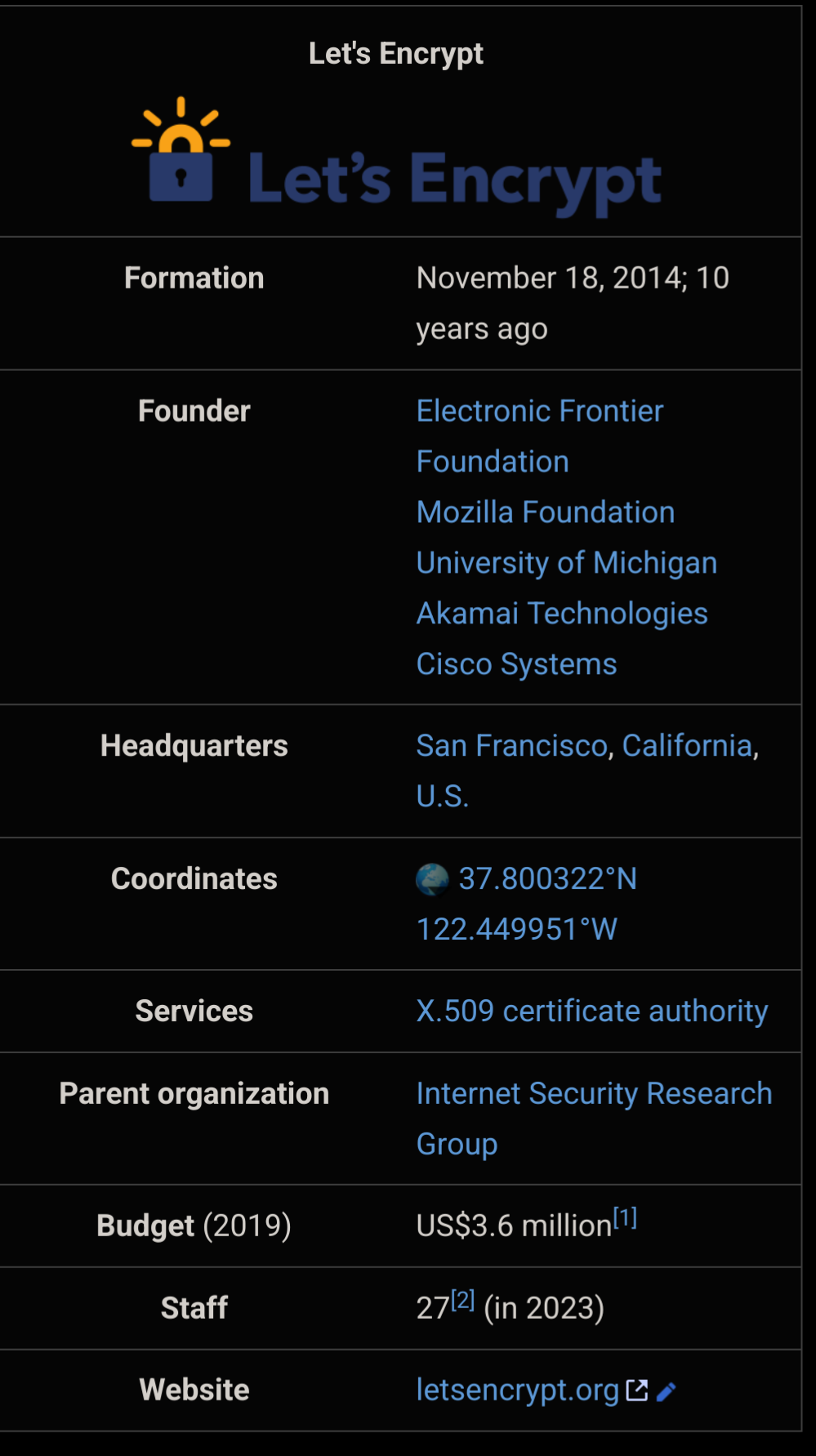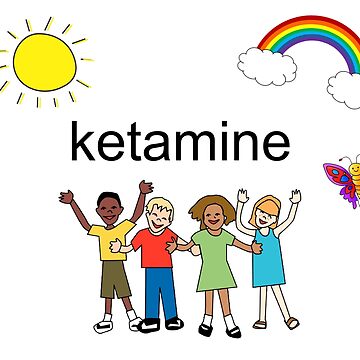- cross-posted to:
- selfhosted@lemmy.world
- cross-posted to:
- selfhosted@lemmy.world
Happy birthday to Let’s Encrypt !
Huge thanks to everyone involved in making HTTPS available to everyone for free !

Man I love let’s encrypt, remember how terrible ssl was before the project landed?
Crazy times. Nowadays it’s weird when a website doesn’t have https. Back then it was pretty much big companies only. And the price of a wildcard certificate…
Except for neverssl.com
Triggering the launch of captive portals for public Wi-Fi users everywhere yayy
That website says it will never use SSL, but it definitely just connected over https with a valid certificate when I went there.
That’s odd. Try httpforever.com instead.
Nice yeah that site actively rejects https connections.
I just use an IP address, they always resolve http and I can type 1.1.1.1 faster.
I did not have the money to pay the insane amounts these greedy for-profit certificate authorities asked, so I only remember the pain of trying to setup my self-signed root certificate on my several devices/browsers, and then being unable to recover my private key because I went over the top with securing it.
And if you remember, that this whole shebang was only started, because Snowden revealed that the NSA spied on all of us, it’s getting much much darker.
People behave as if having a green lock icon were enough to consider you’re safe.
People behave as if there were not multiple cases of abuse of PKI.
People behave as if all those whistleblowing cases exposing widespread illegal activities by the state were not treated as normal, except those exposing them being chased and vilified.
What I’m trying to say is that we’re past the stage where techno-optimism about the Internet made sense. They just say in the news that abusing you is good, and everybody just takes it.
I always had to fill out multiple pages of forms to get those free 1 year “trial” certs from startssl.
Oh man, I forgot about startssl until just now. I definitely had a few of those certs. If you wanted something fancy like a wildcard cert back then, you were paying $$$
Luckily, wildcard certs are insecure and should be avoided.
Wildcard certs are perfectly fine. Your own instance lemm.ee is using one right now.
Obviously there could be issues if subdomains are shared with other sites, but if the whole domain is owned by 1 person, what does it matter?
If one system is somehow compromised, the attacker could effectively impersonate all the systems on your entire domain if they had the wildcard cert. Maybe it’s not a huge deal for individuals but for companies or other organisations it could be extremely dangerous.
If someone wanted a wildcard cert at work I would be very cautious before I even considered issuing one. Unfortunately there are a few wildcard certs on our domain, but those are from before my time.
Having a certificate for any subdomain has implications for other sibling domains, even without a wildcard certificate.
By default, web browsers are a lot less strict about Same Origin Policy for sibling domains, which enables a lot of web-based attacks (like CSRF and cookie stealing) if your able to hijack any subdomain
Remember they wanted like $75 for certs? The gall.
When you have to use it, then yes. But in general standard technologies of today are mostly rigged.
I remember the days when each site that wanted to use SSL had to have a dedicated IP.
And it changed the Internet, for good and a lot.
SSL Certs were so god awful before certbot that it’s hard to explain now that it’s so easy and free.
Also fucking expensive
Damn! That’s definitely a “I’m old” moment for me. I still remember when I first heard about the concept and I remember setting it up the first time on a self hosted project (which seemed harder back then).
Awesome project!
A client of mine pays for an SSL cert he doesn’t even use. I’ve told him before I moved him to Let’s Encrypt because I was able to automate the renew process. He decided he needed to continue paying for the SSL cert. I told him we are not using it, but he doesn’t believe me. So he continues to pay for it.
I love it when companies are too stubborn to update their costs despite the necessity changing over the years.
My previous employment kept buying microsoft office license keys despite us already moving to 365. They probably did it out of habit when buying new computers. Needless to say I have a cardstack of license keys at home lol. Granted it’s for Office 2013 but I don’t really need the latest version for basic document processing.
Private sector is more efficient my ass
TLS certificates have huge margins, so web hosts love selling them.
Lol I instinctively freaked out when I saw the post preview assuming it was going to be a post about a major data breach or exploit of some sort relating to Let’s Encrypt.
I probably need more positivity in my life 😂
I worked for a company we had 300 websites, the boss wanted to buy certs. I told him about Lets Encrypt. He loved the idea it saved us a bunch of money. I suggest we donate $100 to them. Hes says “NO F-ing way!”.
And my parents still buy SSL certs because that’s just what they know 🤢
Today it’s just more or less stupid to buy SSL you can get one extremely easy for free from Let’s Encrypt or Google Trust…
Yeah, I uh…I think that’s kinda what this whole conversation here is about
I’ve tried explaining to them before, but they think that it’s a scam because it’s free lol
My last cert renewal was $20 for 3 years. That’s less than a dollar a month, not exactly breaking the bank.
It’s been a bit since I’ve asked them, but they certainly complained about the cost before. Almost as much as the hosting itself for sure.
It doesn’t say on the website but on their anniversary day they are giving away unlimited ssl certs!
Well, they do rate limit
Let’s Encrypt is amazing, but are there any equally trustworthy alternatives people could switch to if something bad happens to it?
They came up with the ACME protocol, so presumably somebody could. The real barrier to entry is the cost of getting into that certificate chain of trust. I have no idea why it’s so difficult and expensive.
Well, it’s difficult, as it should be, because if you control a certificate in the active chain of trust of browsers, you can hack pretty much anything you want.
Correct me if I’m wrong, but isn’t the CA only signing your public key to prove identity/authority? I don’t think the CA can magically MITM every cert they sign.
The impact is not serious enough to warrant a $1m entry fee, IMO. At best, someone could impersonate a site. They’d also have to get other things in line (e.g. DNS hijacking) to be at all successful anyway. And it’s not like most people are authenticating certs themselves. They just trust browsers to trust CAs that vouch for you and prevents those scary browser warnings.
It doesn’t improve encryption compared to a self-signed cert though.
If you are the CA, you can sign a new certificate yourself for google.com and the browser will accept it. It’s effectively allows MITM for any certificate. Worse, it’s not even limited to certificates under that CA. The browser has no way of knowing there’s 2 “valid” certs at once, and in fact that is allowed regardless (multiple servers with different instances of the SSL cert is a possibility).
Certificate pinning might save things, since that will force the same certificate as was previously used, but I’m not sure this is a common default.
If it begins to enshitify, someone will quickly take up the helm. It’s become so core now that someone like Cloudflare would just be like “We do this now.”
Cloudflare sort of provides this now by being a MITM to secure your site between your server and the end user. But this requires you and your end user to trust Cloudflare.
And fwiw the ACME protocol is open so anyone can implement it. I believe even the ACME software that EFF sends out allows you to choose your server with some configuration.
Cloudfare means no click from me (TBH after I clicked)
Yup, it does. I think I still have my server hard coded from when it first launched.
I think Cloudflare enshittifying is a bigger risk that Let’s Encrypt.
Maybe ZeroSSL
They don’t offer wildcard certs, but otherwise I think they are.
I wanna say acme.sh defaults to them.Never used them, but they state at https://zerossl.com/features/acme/ that their free acme certs include wildcards.
Yes, seems you are right. Not sure where I got the impression.
Unrelated, when I researched this I saw that acme.sh, zerossl, and a bunch of other acme clients are owned by the same entity, “Stack Holdings”/“apilayer.com”. According to this, zerossl also has some limitations over letsencrypt in account requirements and limits on free certificates.
By using ZeroSSL’s ACME feature, you will be able to generate an unlimited amount of 90-day SSL certificates at no charge, also supporting multi-domain certificates and wildcards. Each certificate you create will be stored in your ZeroSSL account.
It is suspicious that they impose so many restrictions then waive most on the acme api, where they presumably could not compete otherwise. On their gui they allow only 3 certificates and don’t allow multi-domain at all. Then even in the acme client they somehow push an account into the process.
[…] for using our ACME service you have to create and use EAB (External Account Binding) credentials within your ZeroSSL dashboard.
EAB credentials are limited to a maximum per user/per day. [This might be for creating them, not uses per credential, unsure how to interpret this.]
This all does make me slightly worry this block around apilayer.com will fall before letsencrypt does.
Other than letsencrypt and zerossl, this page also lists no other full equivalents for what letsencrypt does.
I think if LetsEncrypt went away, so would ZeroSSL’s free offer.
However, I do think not having limitations on the API is good; automation is good practice and I guess this is a concession to customers /users who have no automation in place (though this is a sad state by now). LE doesn’t offer anything comparable AFAIK.
ZeroSSL, plus a few paid companies support ACME (I know Sectigo and GoDaddy do). Sure, the latter are paid services, but in theory you can switch to them and use the exact same setup you’re currently using with Let’s Encrypt, just with some config changes.
Huge impact on a tiny budget - that’s extremely impressive. The world could be so much better without rent seeking parasites.
Just two months ago, a security team member dinged one of our services for using Lets Encrypt, as “it’s not as secure as a traditional CA”.
I’d love for them to explain how, if anything the short cert validity and constant re-checking of the domain seems more secure than traditional CAs
I’d also argue that the fact that it’s 100% automated and their software is open source makes it objectively more secure. On the issuing side, there’s no room for human error, social engineering, etc.
It’s sad that these arguments are still being shared. It was the same arguments years ago from people that would just assume that a free cert was inherently unsafe.
Can anyone fill me on this? Why is it so significant?
HTTPS certs used to be very expensive and technically complicated, making it out of reach for most smaller orgs. Let’s Encrypt brought easy mass adoption and changed encryption availability on the web for everyone.
They also made it a open protocol (the ACME protocol), so now there’s a bunch of certificate providers that implement the same protocol and thus can work with the same client apps (Certbot, acme.sh, etc). I know Sectigo and GoDaddy support ACME at least. So even if you don’t use Let’s Encrypt, you can still benefit from their work.
It is the free, easy way to get an SSL cert (plus automated renewals). Without it, maybe HTTPS wouldn’t have been so omnipresent.
And it shouldn’t have been, SSL PKI is an intentionally rigged architecture. It’s intended for nation-states to be able to abuse it.
I’d like much more some kind of overlay encryption over HTTP based on web of trust and what not. Like those distributed imageboards people were trying to make with steganography in emotion.
It’s a trap. Everybody is already in it and it has already been activated, so - the discussion would be of historical interest only.
Yay for their glorious, free trusted ssl certs. Love this project!
Lots of people shitting on stories of people who buy certs.
You do still have to buy a cert if you want one for a .onion. Let’s encrypt still doesn’t support it :(
But…an onion address doesn’t need a cert?
Some apps refuse to work if you dont have TLS, so it depends what you’re running
I’m also having to manually cert every 3 months for my emby instance. It’s a minor inconvenience, but I’m definitely tempted to just buy a yearly.
Why not script it so you don’t have to do it manually?
Your advice is sound, my ability to focus on such a task however… lol
what about certbot?
Emby?
Same idea as Jellyfin / Plex. Self hosted media server. Plex handles ssl certs for you, Emby doesn’t have an automatic process so I’m having to manually replace it every 90 days
Why not use a reverse proxy with this built in? Caddy, Traeffik…
Might be less effort for you to submit a PR













